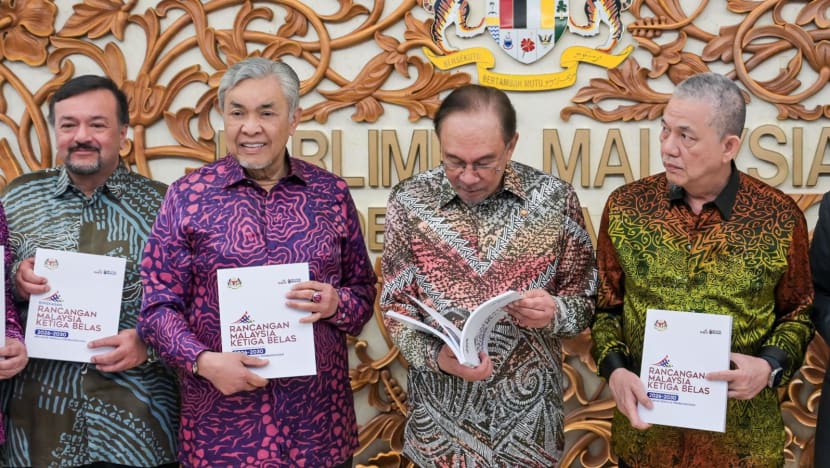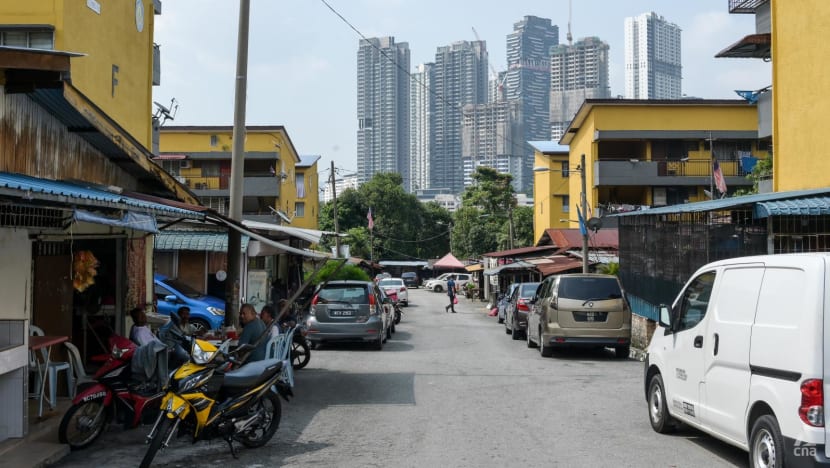Malaysia’s new 5-year development roadmap sees slower economic growth, pledges to tackle living costs
Prime Minister Anwar Ibrahim announced slower GDP growth of 4.5 to 5.5 per cent a year for 2026 to 2030 as he tabled the highly anticipated 13th Malaysia Plan in Parliament on Thursday (Jul 31).

(From left) Malaysia’s Second Finance Minister Amir Hamzah Azizan, First Deputy Prime Minister Zahid Hamidi, Prime Minister Anwar Ibrahim and Second Deputy Prime Minister Fadillah Yusof holding copies of the 13th Malaysia Plan at the Parliament lobby on Jul 31, 2025. (Photo: CNA/Fadza Ishak)

This audio is generated by an AI tool.
KUALA LUMPUR: Malaysia is expecting slower economic growth of 4.5 to 5.5 per cent per year over the next five years amid global turbulence, even as it pledges to improve access to affordable housing, healthcare and good jobs for its people.
Prime Minister Anwar Ibrahim announced the gross domestic product (GDP) growth projection for 2026 to 2030 as he tabled the highly anticipated 13th Malaysia Plan (13MP) in Parliament on Thursday (Jul 31).
The growth target is marginally lower than the 5 to 6 per cent per annum in the 12th Malaysian Plan for 2021 to 2025.
Between 2021 and 2024, Malaysia recorded average annual economic growth of 5.2 per cent.
Anwar said the global economic landscape has been reshaped by an increasingly turbulent world facing prolonged conflicts, and tariff wars by the United States.
“We also need to be wary of the potential increase in the price of goods and rising cost of living, as well as the impact on employment opportunities and food security due to this crisis,” he said as he unveiled the country’s five-year development roadmap.
“This is the difficult reality we must accept in today's world. Bold steps to make changes must be taken to ensure the nation's economy remains strong and the people's well-being is not jeopardised,” he said.
The government projects average inflation to be 2 to 3 per cent a year between 2026 and 2030, and is targeting export growth of 5.8 per cent a year.
The 13MP is the first such plan put forward under Anwar’s coalition government, made up of four main coalitions and 18 political parties.
MORE AFFORDABLE HOUSING, HEALTHCARE IN THE PIPELINE
The Plan seeks to address the pain points of Malaysians, such as cost-of-living issues that, along with the perceived lack of reforms, prompted thousands to take to the streets this month calling for Anwar to step down.
For instance, the government aims for 70 per cent of graduates to be employed in jobs that match their qualifications by 2030.
This is a significant increase from the present. According to research by the Khazanah Research Institute released in 2024, one-third of graduates in Malaysia are stuck in mismatched jobs.
The government has also set an annual Gross National Income (GNI) target of RM77,000 per capita and an average household income goal of RM12,000 per month by 2030.
As of 2024, the government said that the GNI was around RM54,800 while the average household income in 2022 was almost RM8,500, according to Malaysia’s Department of Statistics.
The government is also aiming for 500,000 affordable housing units to be built by the federal and state governments as well as private developers from 2026 to 2030.

On healthcare costs, the government aims to reduce out-of-pocket spending to 32 per cent of total health expenditure, compared to 36 per cent now.
Anwar also said the government aims to reduce the number of foreign workers from 15 per cent of the workforce currently, to 10 per cent by 2030.
The Plan estimates RM430 billion (US$100.8 billion) will be needed for the federal government's development expenditure, compared to the initial RM400 billion earmarked in the 12th edition.
Of the RM430 billion, 52.8 per cent would be channelled to the economic sector, 30.9 per cent to the social sector, 11.8 per cent to security and 4 per cent to administration.
Anwar said Malaysia’s aspirations to be a high-income nation require it to speed up the transition to an economy based on value creation. It needs to foster a culture of innovation, he said.
“Malaysia needs to swiftly move from merely being a consumer to becoming a technology leader and producer of world-class 'Made by Malaysia' products and services,” Anwar said.
The federal government is also targeting by 2030 for the fiscal deficit to decrease to below 3 per cent of GDP, while the government debt level will not exceed 60 per cent of GDP.
In 2024, the fiscal deficit stood at 4.1 per cent while Malaysia's debt-to-GDP ratio stood at 64.6 per cent.
PLAN TO BE DEBATED IN PARLIAMENT
The 13MP will be debated in Parliament next Monday for eight days, followed by four days of ministerial replies from Aug 18.
A mid-term review is conducted for every Malaysia Plan and debated in Parliament.
The mid-term review of the 12th Plan, for instance, was conducted by Anwar in September 2023. The plan was first tabled in October 2021 by the government led by then-PM Ismail Sabri Yaakob.
During the review, Anwar said that the government would be looking at targeted subsidies as well as ways to expand the country’s tax base.
Anwar said in July that the government will announce details of a long-awaited plan to remove blanket subsidies for the widely used RON95 fuel before the end of September.
The subsidy changes will see fuel prices at the pump drop to RM1.99 per litre for Malaysians, compared to the current price of RM2.05, Anwar said.
In July, the government also introduced a sales tax of 5 per cent or 10 per cent on non-essential and luxury goods such as king crab, salmon, imported fruits, racing bicycles and antique artworks.
The sales tax rate was unchanged for essential goods.
A service tax of 6 per cent or 8 per cent was also expanded to include property rentals or leasing, construction, financial services, and private healthcare services.




















